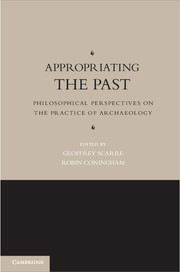Book contents
- Frontmatter
- Contents
- Contributors
- Editors
- Chapter 1 Introduction
- Part One Claiming the Past
- Part Two Problems of Meaning and Method
- Part Three Problems of Ownership and Control
- Chapter 13 Legal Principles, Political Processes, and Cultural Property
- Chapter 14 Monuments versus Moveables
- Chapter 15 Looting or Rededication?
- Chapter 16 Partitioning the Past
- References
- Index
Chapter 16 - Partitioning the Past
India's Archaeological Heritage after Independence
Published online by Cambridge University Press: 05 December 2012
- Frontmatter
- Contents
- Contributors
- Editors
- Chapter 1 Introduction
- Part One Claiming the Past
- Part Two Problems of Meaning and Method
- Part Three Problems of Ownership and Control
- Chapter 13 Legal Principles, Political Processes, and Cultural Property
- Chapter 14 Monuments versus Moveables
- Chapter 15 Looting or Rededication?
- Chapter 16 Partitioning the Past
- References
- Index
Summary
This chapter discusses the fate of Indian monuments and antiquities after India gained freedom from British colonial rule on 15 August 1947. Like several contributions to the earlier collection Ethics and Archaeology (Scarre and Scarre 2006) of which this volume is a sequel, it offers normative reflections on the dilemmas that are faced by archaeologists, and the resolution of those dilemmas. However, because the story of the fate of monuments and museum collections in the aftermath of 1947, in what is best described as an unprecedented situation of turbulence and trauma, is hardly known, there is a strong historical descriptive narrative that runs through this chapter.
The year 1947 saw a redrawing of the political map, as a consequence of which a united India came to be partitioned into the two nation-states of India and Pakistan. This was accompanied by an unprecedented bloodbath, resulting in more than one million dead, and a two-way mass migration involving several million people. Where and how refugee populations were rehabilitated, the mechanism that was adopted for land compensation, the partitioning of resources and departments, the emotional trauma because of displacement and death in the aftermath of August 1947 – these are issues that have been discussed by many historians, most recently by Ramachandra Guha (2007) in his excellent India after Gandhi. What have not been considered are the pressures and problems that India's archaeological past had to face on account of the demographic deluge on the one hand and the division of assets on the other hand.
- Type
- Chapter
- Information
- Appropriating the PastPhilosophical Perspectives on the Practice of Archaeology, pp. 295 - 312Publisher: Cambridge University PressPrint publication year: 2012
- 2
- Cited by



